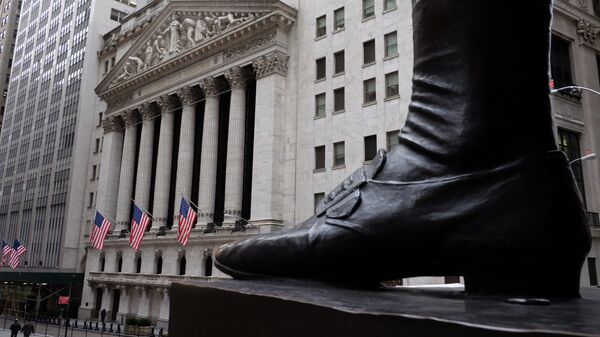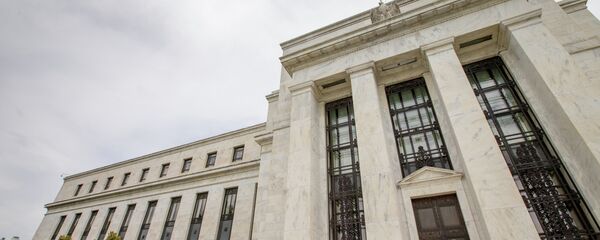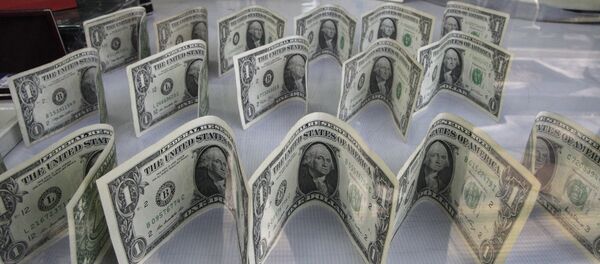Two or more consecutive quarters of declines in corporate earnings in the US preceded periods of economic contraction, or recession, 81% of the time over the past 115 years, according to latest estimates by JPMorgan Chase. Moreover, in the remaining 19% instances, recessions were narrowly avoided via the implementation of either looser monetary conditions or fiscal stimulus, i.e. tax cuts and increased governmental capital investment. The latter does not mean, however, that already-high US budget expenditures will save the day. Through fiscal stimulus, the government provides investment money to the real economy; this is not exactly social spending and it is driving the US budget deficit.
The Federal Reserve Board has been steadily returning its monetary policies back to normality since 2013. That means a full-scale monetary easing would hardly be possible to bring back anytime soon, mainly due to the perceived low efficiency of such measures, repeated within a short period of time (it has been only 7 years since the massive implementation of bond buybacks in 2009).
On the other hand, the administration in Washington is unlikely to successfully coordinate a fiscal stimulus package any time soon, at least until after the elections in November. Uncertainty over the elections' outcome is another concern; however, any increase in the country's already bloated social spending would not help prevent a recession, while capital investment requires thorough planning, which Washington is currently lacking.
According to a separate report by Citibank, the chances of a global recession are on the rise, and the US wouldn't be left unscathed. In Q1 2016, US corporations are unlikely to perform any better earnings-wise, meaning three straight quarters of losses, and that is a more obvious sign of looming recession.
"The weakness in the global economy in recent years has mainly been driven by the manufacturing sector (in a broad range of countries) and [emerging markets]. But most recently weakness appears to be spreading to [advanced economies] and to the services sector," Citi analysts wrote.
Meanwhile, as outlined above, Washington has no clue of how to counter a possible recession when monetary stimulus is largely unavailable. Throughout 2015, indeed, US government spending had been driving the economic expansion, however, a toxic side-effect of such practices is decreased competition in the domestic economy, with private-sector capital fleeing the real economy for the safety of Wall Street — to be decimated in the ‘bloodbath of red' in January.
"Policy response would be ineffective in a number of countries, including the US, the euro area, Japan, the UK, and China. To avoid a recession… the world needs a global version of what we would call ‘Abenomics plus': expansionary or accommodating monetary policy, fiscal stimulus and structural reform — but with far more serious structural reforms and extended to include material deleveraging," Citi warned.
In total, Wells Fargo tested eight models, each predicting chances of a recession in the next six months between 3.6% (based on bond yield dynamics) and 76.2% (involving all indicators).
"The current average probability is 37.3% and this method predicted all recessions successfully since 1980 without producing any false positives," John E. Silvia of Wells Fargo wrote.
Currently, four individual US states are already in recession, accompanied by the termination of businesses and lost jobs, namely, Alaska, North Dakota, West Virginia, and Wyoming. All these states are heavily dependent on the energy sector, i.e. oil extraction, and the decline in oil prices triggered economic struggle.
The entire US is presently facing the reality of substantially weakened overall GDP growth in Q4, while domestic industrial production data are sluggish and macro fundamentals are hardly encouraging either. There might still be a way out, however, the JPMorgan team hinted.
"Absent a pickup in consumption and further weakening in the US dollar, we continue to see a rising risk of an earnings recession in the US," the JPMorgan research team wrote.
Now, Q1 corporate profits are expected to fall 6.5% (after having shrunk 3.6% in Q4), and the Q2 drop is forecast to stand at 1.1%, according to FactSet estimates. Unless the corporate sector rebounds (which is unlikely until after Q3 — and, coincidentally, after the election), economic cycle factors might push the US economy into a period of contraction, as if the existing issues were not enough.





